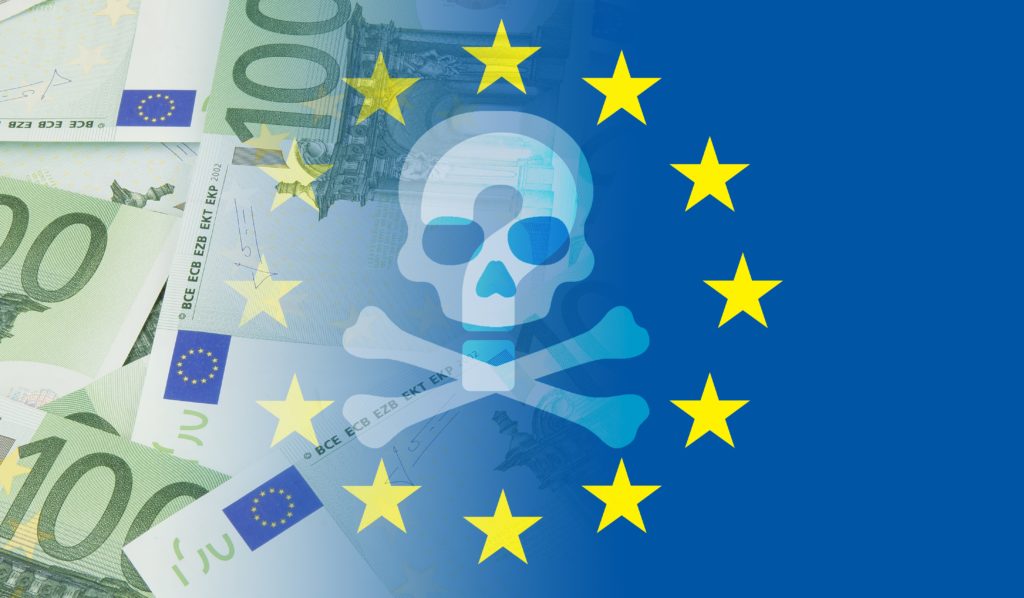PARIS, France: There are stupid mistakes in the world. And then there’s the euro…
Listen to the voices in Europe and across the American intelligentsia, and it would seem the euro is an unmitigated disaster … a currency without a country and a political gambit that has done more harm than good.
Maybe. Or maybe it’s just scapegoating. Everyone has an opinion.
At this point, the opinions are moot. Because while the euro has certainly been problematic, its destruction (a populist plank across a swath of the Continent) would be a far greater catastrophe for Europe and the globe — which means, amid all the euro-skepticism these days, there exists an opportunity for us to profit…
The Birth of the Euro
No doubt about it: Bundling — shoehorning is probably a better word — disparate economies running at different speeds into a single currency was daft. Monetary policy that’s right for one nation is often diametrically wrong for another.
No worries. Because reality is no match for politicians with a dream, no matter how flighty.
Europe has always skated along the edge of a sword, one nationalist rampage away from yet another war, usually involving some iteration of Germans.
One currency is what French political leaders in the 1980s wanted in exchange for supporting West Germany reuniting with its former communist eastern half — a possibility that suddenly rekindled horrific memories of Teutonic rages through the ages. Best to tie yourself to the beast economically and politically in hopes that doing so tames the beast and allows you to better control the beast’s actions.
And so we have the euro, alive now as a tangible currency for just shy of two decades.
The Euro Today
Today, it’s easy for many — most? — Europeans to kvetch about the innumerable ways in which the euro frustrates the masses of ordinary consumers from Athens to Helsinki to Dublin. And by “euro,” Europeans typically mean the bureaucracy of Brussels and the technocracy of Frankfort, home base of the European Central Bank, which has imposed its will on the euro zone.
And, yes, if not for the euro, Greece could have devalued its drachma to address its debt crisis. Italians and Spaniards could have done the same. Cypriot banks would not have failed, and savers would not have lost part of their life savings to a bail-in that rescued the banks on the backs of the people.
If not for the euro, Germans and Dutch and Finns would not have to sacrifice their future to überlow interest rates that save debtor nations at the expense of savers.
All of that is true.
But all of that is not the full story. And it’s the full story that, I’m convinced, means the euro is safe, at least for a while and at least long enough for us to profit from a rebound against the dollar — and probably this year.
New Life for Eastern Europe
Lost in all the euro hating is one simple fact: The euro has improved lives by improving standards of living across Europe.
I’ve traveled to Romania a lot. And to Bulgaria, Poland, the Czech Republic, Hungary and Estonia — all former Soviet bloc buffer states with economies retarded by a half century of kleptocratic state planning.
Romania is like many of them in that it still struggles as a relative newcomer to capitalism. But, as is true elsewhere now, Romanians have greater job opportunities and a far greater choice of products available than ever before. Malls are springing up. High fashion is everywhere. European clothing and eatery chains dot the streets of Bucharest, and the locals fill them up. High-quality boutique hotels attract foreigners and locals alike. Consumers in secondary and tertiary cities have direct, low-cost flights to London, Paris, Barcelona and elsewhere — and increasing numbers of Romanians have the discretionary income to afford vacations there, or just a long weekend of shopping.
Though Romania — and many Eastern European states — isn’t officially part of the euro, the euro nevertheless has played a defining role in opening Romania’s economy like never before.
Eastern Europeans aren’t the euro’s only winners, though.
Unexpected Benefits for Western Europe
I was having breakfast this morning with a pleasant French woman who grew up in the south of France, in Montpellier, but lives now in Paris (and the regions think differently, the way that Manhattanites think differently from, say, Houstonians).
She told me that even in France, the euro paved the way to lower prices for electricity and transport because it opened up competition in an economy that in many aspects was monopolistic, or at the very least sclerotic. Some people rebel against that, because they have been losers in the transition. But society, overall, has largely won.
If populist leaders win in various European states in upcoming elections — I’m not convinced a Trumpian surprise is in the works — and move to push their respective countries out of the euro … well, I just don’t think it’s likely.
I foresaw Brexit succeeding because of “the people.” And I foresaw Trump’s victory because of “the people.”
But in the larger context of Europe and what the euro has meant, I don’t see “the people” acting rashly to leave the euro zone. I do see, however, politicians working to find a solution to reform the euro, though what that solution is at the moment I cannot guess.
The Time Is Now
Ultimately, all of this leads me to my conclusion that now is the time to own exposure to the euro. It’s depressed and beaten down for reasons tied to market fears about the rise of populism and because of unnatural strength in the U.S. dollar.
But there are reasons to believe both of those rationales are not robust.
Until next time, good trading…
Jeff D. Opdyke
Editor, Total Wealth Insider
